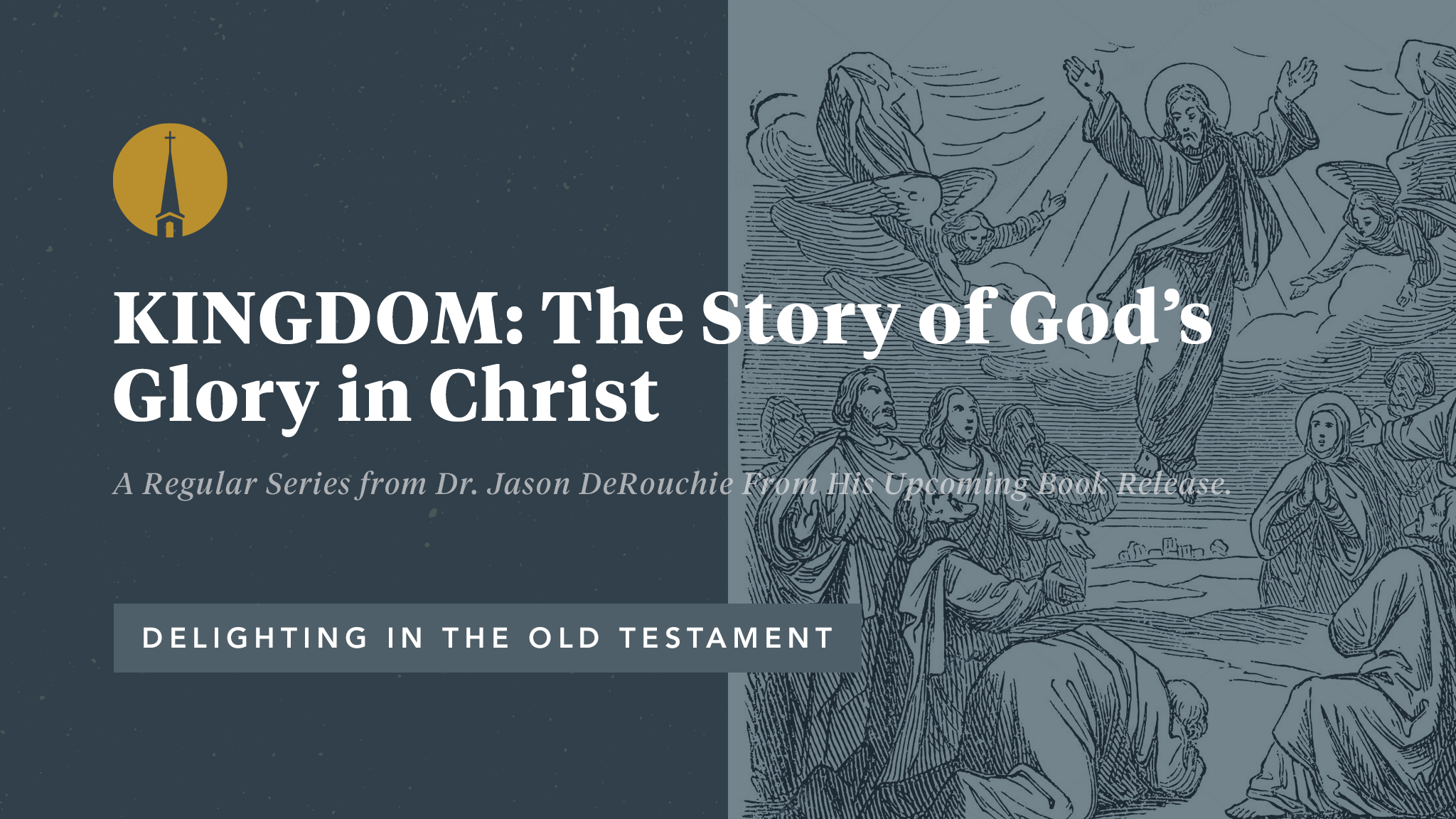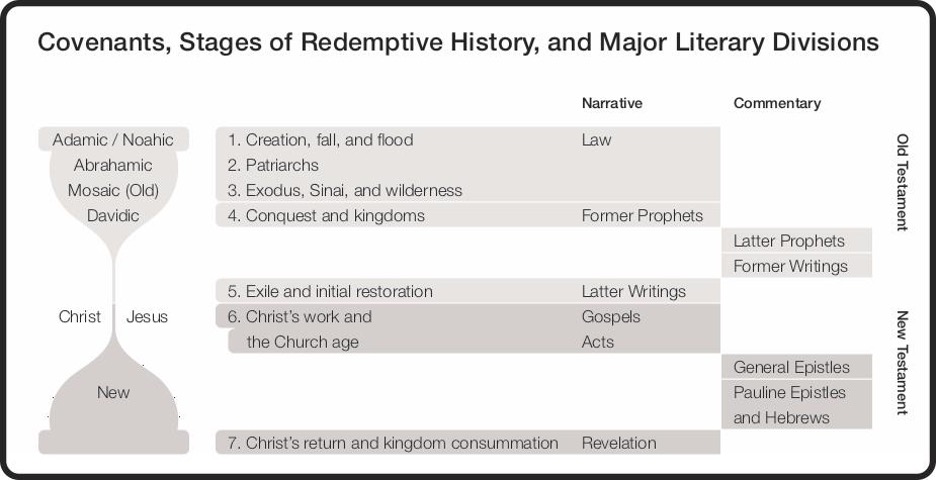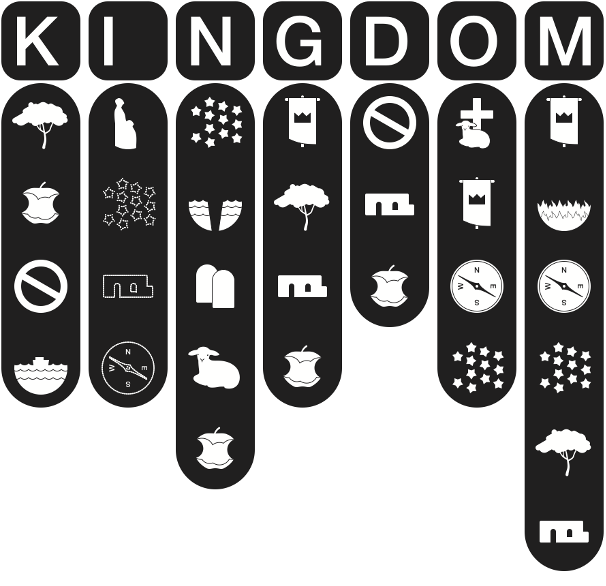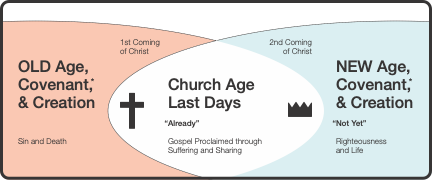
God’s Kingdom Program1
The kingdom that Christ proclaimed and fulfilled (Luke 4:43; Acts 1:3) relates to God’s reign over God’s people in God’s land for God’s glory. God reigns, saves, and satisfies through covenant for his glory in Christ. This theme stands at the core of God’s purposes from Genesis to Revelation.
When the Old and New Testaments are read together, at least seven stages are apparent in God’s kingdom program (see table 1). The initial five are the foundation that is ultimately fulfilled in the last two. The acronym KINGDOM allows for easy memorization.

Table 1. God’s KINGDOM Plan
This story is marked by five overlapping covenants (Adamic/Noahic, Abrahamic, Mosaic, Davidic, and new), the progression of which detail God’s purposes for humanity climaxing in Christ. The interrelationship of the covenants is like an hourglass, with the most universal scope occurring at the two ends and the work of Christ at the center (fig. 1). The titles of the initial four covenants relate to their covenant mediator, whereas the title “new covenant” signals how it supersedes the old Mosaic administration (Jer 31:31–34; Heb 8:6–13).

Figure 1. Salvation History within the Flow of the Bible
Scripture’s storyline indicates that Yahweh’s definitive goal is to display himself as the supreme Savior, Sovereign, and Satisfier of the world, ultimately through his messianic representative. As such, the Bible tells the story of God’s glory in Christ. Alongside the KINGDOM acronym, a set of images will help clarify the flow of God’s purposes (fig. 2).


Figure 2. God’s KINGDOM Plan through Images
1. Kickoff and Rebellion

God created humans to image him and commissioned them to “fill the earth and subdue it” (Gen 1:28). But they failed to honor him and submitted to the authority of Satan (3:1–6), who in turn became the ruler of this world (cf. 2 Cor 4:4). Because Adam acted as a covenantal head, God now counts the rest of humanity as having sinned in him (Rom 5:12, 18–19). From conception, we are condemned sinners under God’s just wrath (John 3:36; Eph 2:1–3), and the result is that all rebel and fall short of glorifying God (Rom 1:21–23; 3:23).
Before subjecting the world to futility (Gen 3:16–19; Rom 8:20–21), Yahweh promised to reestablish cosmic order through a human deliverer, who would decisively overcome the curse and the power of evil (Gen 3:15). Sustained sin after the fall resulted in the flood (6:7–8), but God preserved a remnant and reaffirmed his covenant with creation (6:18; 8:21–9:1, 9–11). At the Tower of Babel, however, humans exalted themselves over God, resulting in Yahweh’s punishment once again (11:1–9).
2. Instrument of Blessing

On the heels of Babel, Yahweh chose Abraham as the instrument through whom he would reverse the global curse. He commissioned him to “go” to Canaan and to “be a blessing” there (Gen 12:1–3)—commands that indicate two phases in the Abrahamic covenant. First, in going to the land, Abraham would become a great nation (fulfilled in the Mosaic covenant). Second, through one of Abraham’s representatives (i.e., the Messiah), God would restore a relationship of blessing with some from all the earth’s families (fulfilled in the new covenant).
Though Sarah was barren (11:30), Abraham believed God’s promise of offspring, and God counted that as righteousness (15:6). To exalt his faithfulness, Yahweh vowed to fulfill his land promise to Abraham’s offspring (15:17–18). He also reaffirmed that he would bless the nations through a royal representative, now identified from Judah (22:17–18; 24:60; 49:8–10). Through this individual, Abraham would become a father of many nations (17:4–6), and the promised land (17:8) would expand to lands (22:17; 26:3–4). For such ultimate good, God sent Joseph to Egypt to keep the Israelites alive amid famine, while awaiting the promised land (45:7–8; 50:20, 24–25).
3. Nation Redeemed and Commissioned

God fulfilled his promises by sustaining Israel through four hundred years of oppression (Exod 1:7). For the sake of his reputation, he brought the plagues on Egypt and redeemed Israel from slavery (7:5; 9:15–16). He gave Israel the Mosaic law to mediate his presence and display his holiness among the nations (19:5–6). He provided a means of atonement so that they could be near him (Lev 9:3–6). And he restated his promise of a royal deliverer (Num 24:7–9, 17–19).
Nevertheless, the majority were “rebellious” and “unbelieving” (Deut 9:23–24). Yahweh did not overcome their hard-heartedness (29:4) but foretold how they would continue to rebel and suffer exile (4:25–29; 31:16–17). Nevertheless, out of his compassion (4:31), he would also restore them to the land (30:3–5), raise up a prophet like Moses (18:15–19), punish their enemies (30:7; 32:35), incorporate some from the nations (32:21; 33:19), and cause all his people to love him and obey his voice (30:6, 8–14).
4. Government in the Land

In Israel’s conquest of the land, Yahweh kept his promises (Josh 21:43–45) and exalted himself before the nations as the only true God (2:11). Nevertheless, without a faithful king, the people did what was right in their own eyes (Judg 21:25), and God’s word became rare (1 Sam 3:1). They sought a king, which God granted, but they wanted him to replace Yahweh (8:7). Because they refused to heed the covenant and listen to the prophets, the united empire was divided (1 Kgs 11:11, 13), and the northern and southern kingdoms came to a ruinous end—exile and a destroyed temple (2 Kgs 17:6–23; 25:1–21).
Despite their rebellion, Yahweh graciously declared that he would fulfill his purposes through King David (2 Sam 7:12, 16). One of David’s offspring would be God’s royal “Son,” who would bless the nations and destroy God’s enemies (Pss 2:7–9; 72:17). This Servant-King would also “bring back the preserved of Israel” and be “a light to the nations,” extending Yahweh’s reign to the ends of the earth (Isa 49:3, 6). While guiltless (50:9; 53:9), he would satisfy God’s wrath against sinners through a substitutionary death and, by his righteousness, “make many to be accounted righteous” (53:5, 10–11).
5. Dispersion and Return

Yahweh cast Israel from the land because the people failed to heed his voice (2 Kgs 17:7; 2 Chr 36:16). But from the depths of exile, Daniel pled for forgiveness and restoration (Dan 9:18–19). Out of his boundless kindness (Lam 3:22–23), God promised that he would establish “a kingdom that shall never be destroyed,” that “one like a son of man” would receive “dominion and glory,” and that all peoples “should serve him” (Dan 2:44; 7:13–14).
In the end, Yahweh prevented the Jews from being annihilated (Esther) and restored them to the land (Ezra-Nehemiah). He commanded them to rebuild the temple (Hag 1:8) and to honor him as the “great King” (Mal 1:6, 14). Yet the story of God’s glory still awaited its consummation. The royal Servant had yet to arrive, and Yahweh had not yet fully realized his kingdom purposes.
6. Overlap of the Ages

Moving into the NT era, one of the mysteries of God’s program was that Jesus would first come as suffering Servant and only in his second coming as conquering King (Heb 9:28). He proclaimed “the year of the LORD’s favor,” but only later would he bring “the day of vengeance” (Isa 61:2; Luke 4:19). Today we live in an overlap of the ages: Christ has delivered us from “the present evil age” (Gal 1:4), yet only in a way that lets us taste “the powers of the age to come” (Heb 6:5). Figure 3 visualizes the aspects of the kingdom that are already fully initiated but not yet finally consummated.

Figure 3. The Overlap of the Ages
In the fullness of time, “God sent forth his Son” (Gal 4:4) as the very Word that was God in the flesh (John 1:1, 14). He is the Christ, the promised royal Deliver, “the Lamb of God, who takes away the sins of the world” (1:29). By his life, death, and resurrection, he inaugurated the new covenant (Luke 22:20; Heb 9:15) and new creation (2 Cor 5:17). In the “great exchange” of the ages, God counts every believer’s sin to Christ and Christ’s righteousness to every believer (Isa 53:11; 2 Cor 5:21).
Jesus and his apostles proclaimed the gospel of God’s kingdom (Luke 4:43; Acts 1:3; 28:23), the good news “that Christ died for our sins in accordance with the Scriptures, that he was buried, that he was raised on the third day in accordance with the Scriptures, and that he appeared to Cephas, then to the twelve” (1 Cor 15:3–5). By means of Spirit-empowered disciples bearing witness to Christ, God’s reign has spread from Jerusalem to the ends of the earth (Acts 1:8). Under Christ’s authority, the church must continue to make disciples of all nations for the sake of his name (Matt 28:18–20; Rom 1:5).
7. Mission Accomplished

The reigning King’s return will be glorious (Matt 16:27; 25:31), for we will see him “coming on the clouds of heaven with power and great glory” (24:30). Only those who “fear God and give him glory” will escape divine wrath when the Son of Man returns to be glorified (2 Thess 1:9–10; Rev 14:7).
Even now, those around the throne of the conquering Lion-Lamb are declaring him worthy to carry out God’s purposes (Rev 5:9–10). And the redeemed multitude will one day cry together, “Salvation belongs to our God … and to the Lamb!” (7:10). In that day, God’s glory—localized in none other than the Lamb—will give his city light (21:23). His servants “will need no light or lamp or sun, for the Lord God will be their light, and they will reign forever and ever” (22:5), thus fulfilling their original calling to represent God on earth (Gen 1:26–28).
In view of these realities, Jesus proclaims, “I am the root and the descendant of David, the bright morning star…. Surely I am coming soon” (Rev 22:16, 20). And we say with John, “Amen. Come, Lord Jesus!” (22:20).
Summary
From creation to consummation, God is guiding a kingdom program that culminates in Jesus. Both the Old and New Testaments are framed by his-story—a story of God’s glory in Christ. In the OT, God identifies the key players and problems and makes kingdom promises; in the NT, he supplies the solution and fulfills the promises, ultimately through King Jesus. All salvation history points to Christ, and through him God fulfills all earlier hopes, to the praise of his glorious grace (Eph 1:6, 12).
1. What follows updates material that originally appeared in Jason S. DeRouchie, “Jesus’ Bible: An Overview,” in What the Old Testament Authors Really Cared About: A Survey of Jesus’ Bible, ed. Jason S. DeRouchie (Grand Rapids: Kregel, 2013), 30–41. Used with permission.
This blog series summarizes Jason S. DeRouchie’s forthcoming book, Delighting in the Old Testament: Through Christ and for Christ (Wheaton, IL: Crossway, 2024). You can pre-order your copy here.

